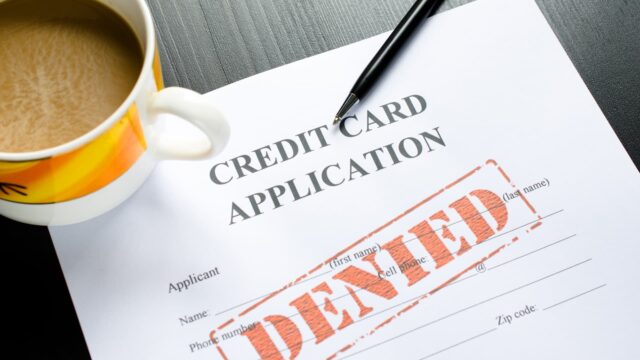
Have you ever applied for a credit card, loan, or another type of financing only to be rejected? If so, you’re not alone. Millions of people apply for and are denied access to the credit they need each year. But what do you do if your credit application is rejected? That’s exactly what we’ll cover in this article – What Should I Do If My Credit Application Gets Rejected?
Being denied access to credit can be a difficult experience. It may leave you feeling embarrassed and uncertain about how to proceed. Fortunately, there are steps that you can take to improve your chances of getting approved the next time around. There might also be ways to improve your current financial situation so that lenders will view your application more favorably.
By reading this article, you’ll gain insight into why applications get declined and learn strategies for increasing your odds of being accepted. We hope it helps reduce some of the confusion and frustration associated with navigating our complex financial system!
Analyze the Reasons for Rejection

Figuring out why your credit application was rejected is the first step to take. The credit card company or lender will typically provide an explanation for their decision, although it may not be clear-cut. Look closely at the reasons they’ve provided and consider how you can address them in any future attempts.
It could be that your personal information didn’t match up with what’s on file with a major credit reporting bureau, like Experian, Equifax, or TransUnion. This doesn’t necessarily mean something negative about your financial situation. Instead, check for errors and make sure all of your data is accurate before submitting another application; this time around, include copies of documents to back up the info you’re providing.
If you don’t have much of a credit history yet, then lenders might feel uncertain about approving you for new lines of credit. In these cases, look into applying for secured cards which require deposits as collateral – building positive payment histories over time can help demonstrate trustworthiness and improve your chances of getting approved in the future.
Improve Your Credit Score

To further improve your chances of getting approved for credit, it’s important to work on improving your credit score. Here are some ways to do that:
- Pay all bills on time – this includes paying off any existing debts promptly and not falling behind in payments.
- Reduce the amount of debt you have by steadily making extra payments or consolidating higher-interest loans into lower-interest ones.
- Monitor the accuracy of the information reported about you by checking your credit report regularly and disputing any inaccuracies with the appropriate agency as soon as possible.
- Limit applications for new credit cards – too many inquiries can negatively impact your score, so only apply when necessary and be sure to compare products carefully before submitting an application.
By taking these steps, you will demonstrate responsibility and reliability over time, increasing the likelihood of being accepted down the line. With a little bit of effort and patience, eventually, you’ll be able to obtain the type of loan or credit product you’re looking for!
Consider Other Lenders

If your credit application is rejected, it doesn’t necessarily mean that you won’t be able to use borrow money app with no credit check or credit product. It may just mean that the lender wasn’t the right fit for you. Consider researching and exploring other lenders in order to find one who meets your needs and has more lenient requirements.
Additionally, consider talking with a financial advisor or credit counselor about ways to create an action plan to improve your chances of getting approved in the future. They can provide guidance on what steps you need to take and help make sure everything is done correctly so there are no delays when applying again. This could involve managing debt, building up savings, or even understanding which types of loans best suit your situation.
It’s important not to give up after being denied. With some time and effort, you’ll likely be able to get approved eventually – as long as you keep working towards improving your credit score and finding lenders willing to work with you!
Review Your Rights As a Consumer

As a consumer, you have certain rights and protections when it comes to credit applications. It’s important to familiarize yourself with these laws so that you can properly defend your interests should you feel as though they’ve been violated. Additionally, be sure to review the Fair Credit Reporting Act (FCRA), which outlines rules for how lenders use and store information obtained from credit bureaus.
Understandably, being denied a loan or credit product can be an upsetting experience – but remember that there are steps you can take if you think something is unfair or inaccurate. You have the right to dispute any incorrect information on your report and request copies of documents related to the application process. This could include anything from letters sent by the lender to inquiries regarding your credit score.
If all else fails, filing a complaint with the Consumer Financial Protection Bureau (CFPB) may help resolve any issues you’re having. The CFPB has tools available for consumers who believe their rights were infringed upon during the application process. Furthermore, this government agency offers assistance in understanding what went wrong and helps guide individuals toward finding solutions moving forward.
Frequently Asked Questions

What Is the Quickest Way to Improve My Credit Score?
Improving your credit score can be a daunting task, but it is essential for many financial activities. Knowing the quickest ways to improve one’s credit score is an important step in ensuring that you are able to make successful applications in the future. There are several methods that can help you raise your credit score as quickly as possible.
One way to do this is by making sure all of your payments are made on time and in full. Payment history has one of the biggest impacts on your credit rating, so staying up-to-date with payments will have a positive effect on your overall score. Additionally, if there’s any information on your report that could be incorrect or out of date, dispute it with the relevant agency so it doesn’t weigh down your scores unnecessarily.
Having a low balance on revolving accounts like credit cards also helps increase one’s credit score; however, using them responsibly is key here. Keeping balances below 30% of their limit shows lenders that you’re good at managing debt and not overextending yourself financially.
Finally, consider opening new lines of credit only when necessary and try not to open too many within a short period of time, as this could negatively affect your score instead.
With these tips in mind and some dedication, increasing your credit score should become much easier over time and ensure smoother application processes going forward.
Are There Any Options for Getting a Loan with A Bad Credit Score?
If you’ve got a bad credit score, don’t give up hope of getting a loan. There are still plenty of options available to you. In fact, it can be easier than you think to find the right lender for your needs.
One option is to work with an online lender that specializes in loans for people with poor credit scores. These lenders understand the unique challenges faced by borrowers and may be more willing to offer financing despite a low FICO score. They also often have lower interest rates than traditional banks or credit unions because they take on less risk when approving applications.
Another way to get approved for a loan, even if your credit isn’t great, is to apply with a cosigner who has strong financial credentials. This person will guarantee repayment of your loan and assumes responsibility if you fail to meet payment obligations. Having someone vouching for your good behavior can increase the chances that you’ll be able to secure financing from reliable institutions such as banks or credit unions.
No matter what route you decide to go down, make sure that any potential lenders are reputable and trustworthy before signing any contracts or agreeing to terms and conditions. With the right research and preparation, there’s no reason why anyone should struggle with obtaining finance due to their low credit score.
How Long Does a Rejection Stay on My Credit Report?
When a credit application is rejected, it can be disheartening and confusing. But one of the most important questions to ask yourself afterward is how long this rejection will stay on my credit report. The answer depends on several factors, including what type of loan you applied for and why your application was denied in the first place.
If you were turned down due to negative information already present on your report (such as late payments or collections), that item might remain there for up to seven years. However, if the denial was because of insufficient income or lack of established credit history, that information won’t show up at all. In some cases, lenders may provide feedback about their reasons for not approving an applicant’s request, which could also help inform any future applications.
It’s always wise to check your credit reports regularly so you can keep track of whether any incorrect items have been added due to a declined application. If they’re still showing after 30 days following the rejection, then you should contact the lender directly and dispute any false entries with both them and the Credit Reporting Agencies (CRAs). Doing this will ensure your record remains accurate and protected from potential fraud damage in the future.
TIP: Make sure to review your free annual credit reports thoroughly each year—available through AnnualCreditReport.com—as well as monitor your scores throughout the year so that you can address any inaccuracies right away, should they occur!
Should I Apply for A Loan with A Cosigner?
Applying for a loan with a cosigner can be a great way to help get approved for credit if your own application is rejected. It is important to understand, however, the risks and benefits associated with having someone else on your loan before making this decision.
A cosigner agrees to take responsibility for repaying the debt should you default or fail to make payments in time. The presence of a cosigner may improve your chances of getting accepted since they are vouching for you financially. However, it also means that if anything happens and you cannot pay back the loan, both parties will suffer damage to their credit score and financial standing.
It’s essential to consider all angles here when deciding whether or not applying for a loan with a cosigner is right for you. Have an honest discussion about expectations between yourself and any potential cosigners so everyone understands what could potentially happen in different scenarios. Ultimately, it’s up to you whether taking on such a risk is worth pursuing, depending on your individual situation.
Is There a Way to Dispute a Rejection Decision?
When a credit application is rejected, it can be disheartening and leave you wondering what to do next. Is there any way to dispute the decision? Yes! Here are some steps that may help:
• Get in touch with the lender. The first step after being rejected for a loan should be to contact the lending institution or bank that made the decision. Ask them why they denied your request and if they have any suggestions on how you could improve your chances of approval in the future.
• Request an explanation from the credit bureaus. If your rejection was related to the information contained in one of your credit reports, reach out to each of the three major credit bureaus – Experian, Equifax, and TransUnion – in writing, asking for documentation about their findings. This could include copies of accounts listed on your report as well as any public records associated with those accounts (such as bankruptcy judgments).
• Check the accuracy of all reported data. Thoroughly review this paperwork and make sure all information is accurate; errors happen more often than people think! A single mistake like an incorrect address or misspelled name could cause enough damage to keep you from getting approved for financing, such as a mortgage or auto loan, so it’s important to double-check everything thoroughly before continuing with other options for funding.
• Consider applying again at a later date after making corrections/improvements needed based on feedback from lenders and/or credit bureau(s). After reviewing all documents, if applicable, take corrective measures by paying down debt, closing unused accounts, etc., then apply again nine months later when these changes have had time to reflect positively in your score/report status according to FICO scoring system rules. Doing this will give you another chance at approval without having to resort to using a cosigner which might not be possible anyway, depending on circumstances surrounding the original denial decision
Conclusion

The bottom line is that getting rejected for a credit application can be disheartening, but it’s important to remember that there are still solutions and options available. To improve your chances of being approved the next time around, take steps to boost your credit score quickly.
Additionally, if you have bad credit, consider applying with a cosigner or exploring other loan opportunities. Finally, always make sure to dispute any incorrect information on your report and investigate the reasons behind why your application was turned down in the first place. With persistence and dedication, you will eventually find an option that works best for you!












